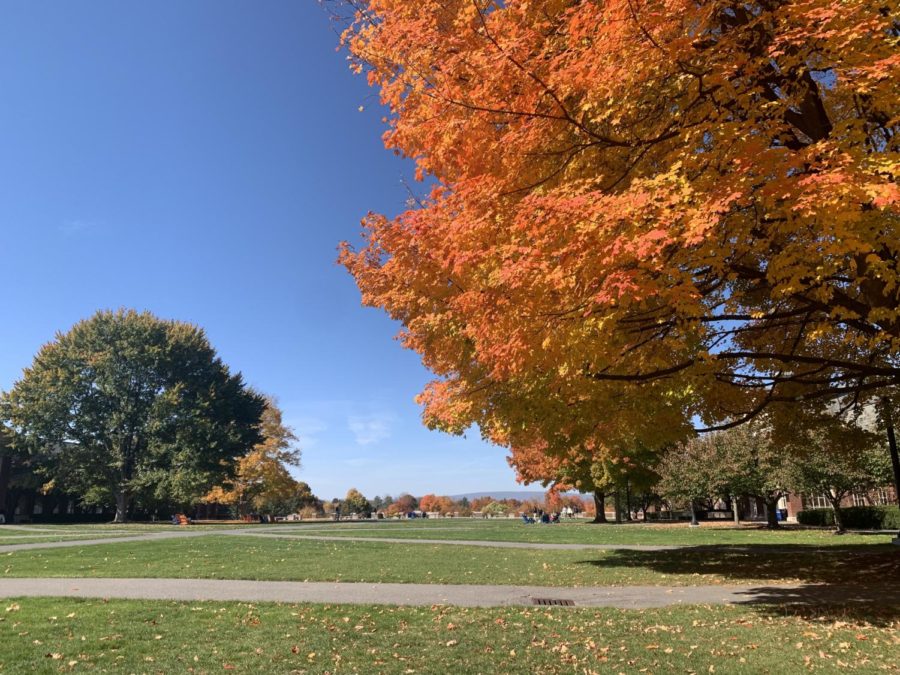Bucknell University progresses towards a more sustainable campus
March 31, 2023
Bucknell University began drafting their sustainability plan in 2017, with one of its largest goals being achieving carbon neutrality by 2030. In the upcoming years, there are various initiatives the university will be enacting in order to reach this end goal. Working closely with the Bucknell Farm, dining facilities and the Office of Campus Sustainability, the campus has been able to begin making this progress.
The 2022-23 University Report lists five of their largest initiatives from this academic year: an on-campus solar array, a new natural pathway, partnerships with the Bucknell Farm, hyper-local dining and Holmes Hall achieving LEED Gold certification.
In March of the previous academic year, the new management and arts building Holmes Hall was awarded for its planet-friendly design. Some of its features include enhanced ventilation, water-conserving bathroom facilities and outdoor rain gardens and bioswales. Holmes Hall is the seventh building on Bucknell’s campus to be awarded the LEED Gold Award.
Bucknell celebrated the completion of the 1.76 peak megawatt solar array on Oct 2, 2022. The array now supplies seven percent of campus electricity. The panels also offer accessibility to hands-on and visual learning centered around solar energy.
“I think the progress towards solar power is really important,” Isabelle Levesque-Du Bose ’23, a renewable energy scholar, said. “To utilize more solar energy on campus, I think that we have to put aesthetics aside and avoid keeping solar panels isolated, and instead advance towards having them on roofs of academic buildings.”
In the summer preceding the 2022-23 school year, construction began on Bucknell Greenway, a 4-mile multi-use pathway along the perimeter of the campus. This path helps to connect the separation of campus caused by Route 15, and borders locations such as the Grove, the farm and Christy Mathewson stadium. The construction was completed in the fall semester of this year.
“Part of this initiative is about raising our awareness of the natural landscape around us and the ways Bucknell is contributing to sustainability,” Technology Desk Manager Bud Hiller is quoted in the university website. “So there’s the option to add features like pollinator gardens to enhance the path even further.”
The Bucknell Farm has been an important part of campus since 2018, but the opportunities it can provide continue to evolve each year. Per the 2022-23 University Report, “the Bucknell Farm partnered with more than 50 courses from all three colleges, as well as three Residential Colleges, resulting in nearly 25 percent of Bucknell students having an on-site, hands-on experience at the farm.”
To further enhance this, the farm hopes to eventually add an experimental wetland space and an outdoor classroom.
While Bucknell Dining does not presently source food from the farm, dining services have created an even more local source: indoor Babylon Micro-Farms. These compact greenhouse-like structures can be found in the Bison and Bostwick Cafe, growing fresh herbs and vegetables that will find their way to students’ plates.
Bucknell has also recently introduced an Environmental Honors Society, Epsilon Eta. They are currently in a brainstorming stage while working the campus farm and other local farms in order to create access to organic foods at B-Eats. Despite its new presence on campus, the society has already made some accomplishments in promoting sustainability.
“We provide recycled office and school supplies through the Sustainable Office Supply Store run out of the bottom floor of Taylor Hall,” Grace English ’25, a member of Epsilon Eta, said. “The entirety of our society has opportunities to volunteer there and I myself have spent many hours in the store.
“Epsilon Eta additionally sponsors activities such as trash cleanup around campus and golf ball cleanup on the golf course, as the golf balls often end up in the ditch and impede the water supply,” English said. “This initiative is very important because our entire campus is actually on one huge watershed. The fields, golf courses, and new construction near the Mods were once rivers, and that water still exists there. The more building we do, the higher the risk for flooding there is.”






















